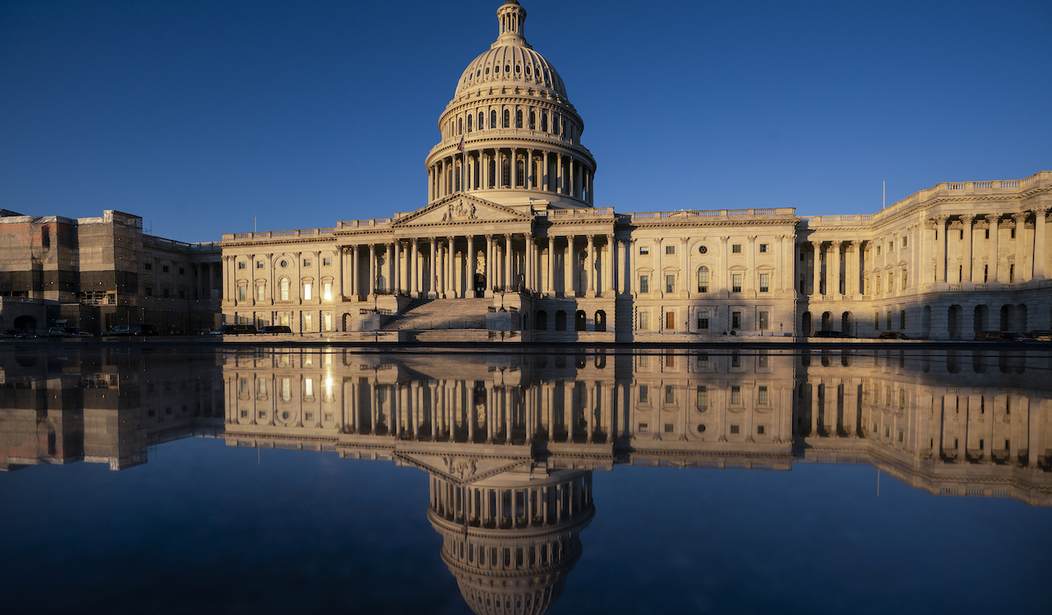In an apparent effort to rally the base, House Leadership has jammed an environmental activist project, the PFAS Action Act of 2021, into the National Defense Authorization Act (NDAA) -- a move that threatens military readiness and supply chains.
The bill “establishes requirements and incentives to limit the use of perfluoroalkyl and polyfluoroalkyl substances, commonly referred to as PFAS, and remediate PFAS in the environment.”
PFAS can be found in a wide variety of products like non-stick pans, weatherproof clothing, carpets, belts, food packaging and various other usages. Without PFAS chemicals we wouldn’t have smartphones since they help stabilize them and help cool data centers for cloud computing.
Perhaps most importantly for the military, PFAS has been commonly used in Aqueous Film Forming Foam (AFFF) since the late 1960s. It’s the best tool to extinguish “Class Bravo” fires of fuel oil, greases, paints, solvents and other flammable substances commonly found aboard ship. The horrific lesson learned from the fire aboard USS Forrestal (CV-59) led to the manufacture of AFFF and its reliable use ever since.
Recognizing the impracticality of including this in the NDAA, the Biden administration has quietly pushed back on House Leadership. Buried back on page four, paragraph four of the Sept. 2021 Office of Management and Budget (OMB) Statement of Administration Policy in response to the House version of the NDAA, the Biden Administration offered House Leadership:
Recommended
“(the NDAA as written) would prohibit DoD from procuring a wide range of items that may contain PFAS. If implemented in its current form, it would not be feasible for DoD to test all of these items to determine if they contain PFAS. In addition, some of these products may not have PFAS-free alternatives available.”
The NDAA was selected as a vehicle for this bill because it’s a “must-pass” piece of legislation, consuming over 50 percent of the discretionary portion of the annual budget. Must-pass bills become magnets for everything House Leadership can add to them. This is because these “Christmas Trees” form the basis of the only legislation which House Leadership is certain to take up.
Nationally, PFAS has been phased out of production for years and replaced with substitute compounds. But since the Defense Department operates globally with nearly 3 million service members and civilians working and living in over 160 countries, Congressional passage of such broad PFAS regulations and restrictions would practically paralyze the military supply system.
And the PFAS issue is much larger than DoD.
Over the years, Congress has supported multiple studies by the Environmental Protection Agency (EPA) and other federal agencies aimed at prohibition and also clean-up of contamination sites (largely local water supplies). The danger of compounds containing PFAS is still not completely understood but the potential for long-term harm was high enough that universal agreement for eliminating PFAS compounds in both the private and public sector was enthusiastically reached.
Yet instead of allowing the EPA to finish its work and promulgate regulations concerning continued clean-up of affected watersheds and further remediation, Congress is ignoring the science and seeking to require expensive and unmanageable timelines for work already in progress.
In July, thirteen key organizations representing nearly the entire the U.S. water sector expressed their objections to the legislation, writing:
“. . . The bill as currently structured would also mean that municipal drinking water and wastewater utility ratepayers could face staggering financial liability to clean up PFAS that was legally disposed of following the water treatment process.”
So, in order to take credit for work accomplished over decades, paid for by the private sector, and overseen by EPA, Congress has decided to take on the responsibility for both micromanaging the clean-up and mandating local payment and inflicting a huge procurement challenge on DoD.
If Congressional Leadership feels so strongly about legislating this matter now, let the House take this important issue up in regular order.
Forcing the PFAS Action Act into the NDAA is a poor but sadly increasingly common practice for Congressional Leadership – driving partisanship and drawing time and energy away from the most important issues of the day. The PFAS Action Act of 2021 should be removed from the NDAA and left to those already successfully working the issue.
Mike Flanagan represented the 5th District of Illinois in the U.S. House of Representatives. He sat on the Committees on the Judiciary, Government Reform and Oversight, and Veterans' Affairs.

























Join the conversation as a VIP Member